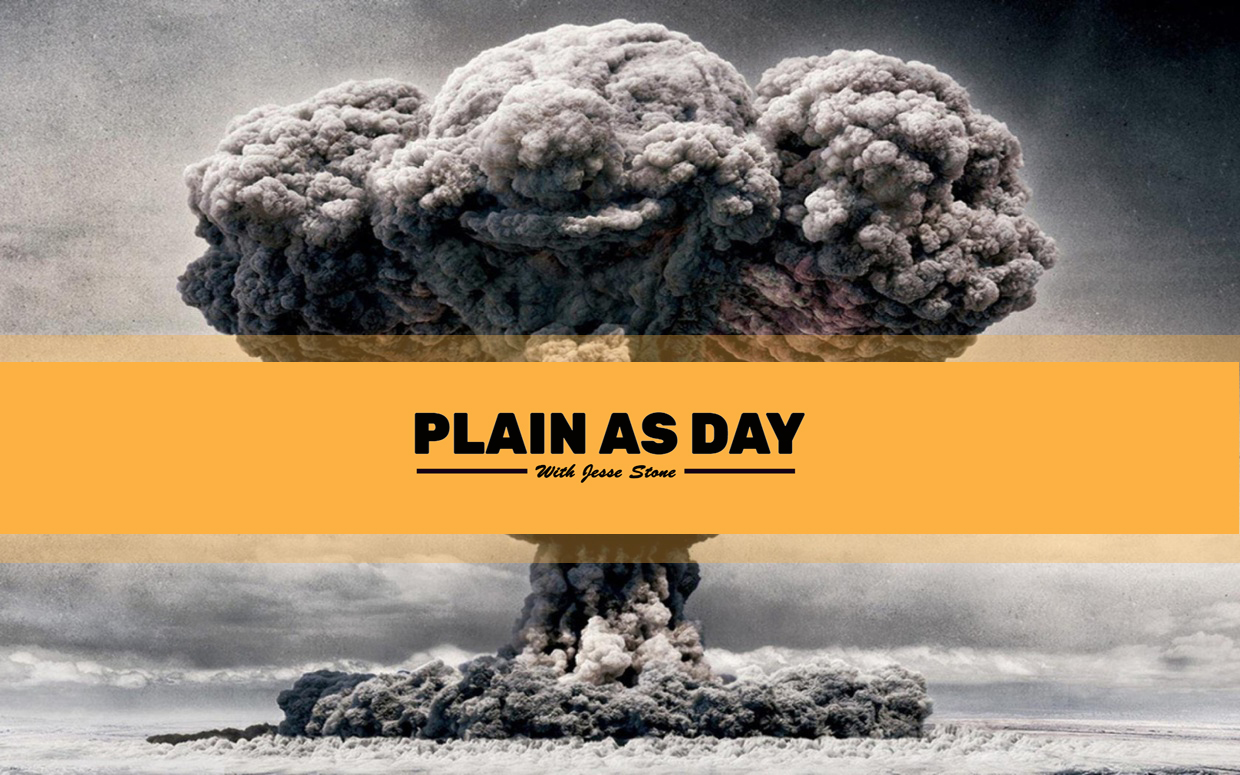
Prompt Images
1. Do I Need to Be Concerned?
Yes. Yes. Yes. A Thousand Times, Yes.
2. So How Likely Are We Talking Here?
Well, for starters, Donald J. Trumpet (h/t, my 3 year-old son) is President of the United States, and there’s literally nothing that is off the table. Think I’m being another apoplectic liberal? Here’s Trump in an interview with Fox News, actually saying nothing is off the table, even in Europe:
Europe is a big place. I’m not going to take cards off the table. We have nuclear capability. Now, our capability is going down rapidly because of what we’re doing. It’s in bad shape. The equipment is not properly maintained. There are all lot of talk about that [sic, sic man]. And that’s a bad thing not a good thing. The last person to use nuclear would be Donald Trump[et]. That’s the way I feel. I think it is a horrible thing. The thought of it is horrible. But I don’t want to take anything off the table. We have to negotiate. There will be times maybe when we’re going to be in a very deep, very difficult, very horrible negotiation. The last person — I’m not going to take it off the table. And I said it yesterday. And I stay with it.
That said, I don’t think it’s likely that President Trumpet will blow the nuclear horn. Nor do I think it’s very likely that Putin or Lil’ Kim or anyone else in the Bad Guys with Bombs club would actually launch a nuclear weapon. (Though to be clear, if I had to pick, all of my money would be on Lil’ Kim. Did you read about how he killed his half brother?)
Unfortunately, I think it’s much more likely that a nuclear weapon might go off by accident. A couple things have recently convinced me that this might be the greatest threat humans face as a species.
The first was Eric Schlosser’s piece in The New Yorker in December, entitled World War Three by Mistake. You can gather the gist from the title. Schlosser explains how on June 3, 1980 President Carter’s national security advisor, Zbigniew Brzezinski, was woken in the middle of the night and told that the Soviet Union had just launched a nuclear attack against the U.S. The missiles would likely hit their targets in minutes. Originally Brezinski was told 220 missiles had been launched by the Soviets, then moments later he was informed it was 2,200.
Of course you have probably never heard of the June 3rd nuclear attack. That’s because, like the Bowling Green Massacre, it never happened. Turns out the 2,200 missiles were imaginary—the grandiose delusions a malfunctioning computer chip. Fortunately for all of mankind, Brezinski got word of the false alarm before he had the chance to call Carter and recommend an immediate counter strike.
We were literally a few minutes from World War III. June 3rd, 1980 has to go down in history as the closest we’ve ever come to a mass extinction event since the dinosaurs got their comeuppance. And that was just Schlosser’s icebreaker.
He also completed a full accounting of our nation’s nuclear fatuity, detailing the 443 Minuteman III intercontinental missiles that comprise part of our nuclear portfolio.

Here’s Schlosser’s description of the arsenal:
[The missiles are] sitting in underground silos scattered across the plains of Colorado, Nebraska, Wyoming, Montana, and North Dakota. The missiles are kept on alert, at all times, ready to take off within two minutes, as a means of escaping a surprise attack. Each missile carries a nuclear warhead that may be as much as thirty times more powerful than the bomb that destroyed Hiroshima.
Schlosser describes the state of the Minuteman command center in words that bring to mind the underground bunker in Lost, complete with a 1976 IBM computer and floppy disks.

The military operates the Minuteman III missiles on a “launch-on-warning” policy. Meaning they may be fired if they detect enemy missiles heading our way. And by “detect,” I mean if a computer tells them. Just like a computer told the Air Force about imaginary missiles heading towards the U.S. on June 3, 1980.
Now if you are thinking, hey, these systems should have a “self-destruct” button to destroy the missiles en route should someone realize it was a false alarm! Fear not, the Air Force already thought of this. And adamantly opposed any such protections. And I quote, “After being launched, a Minuteman III cannot be remotely disabled, disarmed, or called back.”
Now if reading a long New Yorker article isn’t your thing, you may want to plop yourself down in front of your television and watch Command and Control, a documentary based on Schlosser’s book of the same name. This was released in January, and all I can say is it is some of the most riveting television you will ever watch. The upshot is that in 1980 (something about that year, I guess) soldiers performing routine maintenance on a Titan II nuclear missile in an underground silo in Arkansas accidentally dropped a socket.

Said socket fell several stories (because the Titan II is a big ol’ missile) before ricocheting off the ground and puncturing a hole in the rocket’s fuel tank. This happens in the first 5 minutes of the film, and you spend the rest of the time waiting to see whether they are able to diffuse the situation without setting off a nuclear explosion that would have been 600 times more powerful than the bomb dropped on Hiroshima. NBD.
And if you still aren’t concerned with a few anecdotal incidents, consider that there have been at least 32 “Broken Arrows”—accidents involving nuclear weapons—across the globe since the 1950s. NBD.
Like that time a fighter jet collided with a B-47 bomber carrying a Mark 15 nuclear bomb. Thankfully, the bomb didn’t detonate. Unfortunately, the Air Force never could find it and declared it lost at sea. NBD.
And there’s the terrifying story of a B-52 bomber carrying two Mark 39 nuclear bombs that just broke apart in mid-air. One of the bombs was found, rather adorably, with its parachute tangled up in a tree. The other bomb, which didn’t deploy a parachute, plunged into the ground to a depth of 20 feet.
Honestly, I’m not sure if I’m more terrified by the accidental dropping of two nuclear weapons or the fact that every so often planes just break apart in mid-air. Both seem completely unacceptable to me.

3. Shit, shit, shit, shit.
Yes. My thoughts exactly. It feels like it’s only a matter of time before a nuclear weapon goes off, be it by purpose or accident.
4. What Can I Do to Increase My Odds of Surviving a Nuclear Attack?
Nothing. I mean, you can try hiding under a desk, but I sort of doubt that will matter.
5. How Can I Remain Calm and Maintain Some Dignity In Those Last Few Moments Before the Bomb Drops?
I suggest finding something to focus on:
Your breath.
Your family.
Perhaps even the nuclear explosion itself. Because knowledge is power. And you might as well get yours while you can, before that bomb releases the equivalent of 50 million tons of TNT.
In Part II of this piece we will explore the science behind nuclear bombs—to empower you in the event of an imminent nuclear explosion. NBD.


